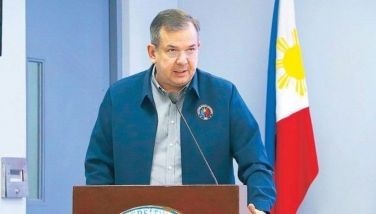'Wildkat' to promote Harlem tour
Former University of Arizona cager Eugene (Wildkat) Edgerson is arriving in Manila next week to promote the Harlem Globetrotters’ three-game, two-night stand at the Araneta Coliseum on May 24 and 25.
Edgerson, 31, is known as the Trotters’ “advance ambassador.” He will preside in a press conference with local media and perform tricks at halftime of the PBA All-Star Game at the Big Dome on April 26.
The 6-7 forward is in his sixth season with the Globies and has popularized the “old school” look of wearing kneepads, high socks and an Afro. Among his Arizona varsity teammates were Gilbert Arenas, Luke Walton and Richard Jefferson, now all playing in the NBA.
Edgerson took his education at Arizona seriously and even sat out a season to concentrate on earning his degree in elementary education. He wound up not only with an undergraduate diploma but also a Master’s degree in Teaching and Teacher Education. The lure of basketball, however, took Edgerson away from the classroom and onto the hardcourt. He’ll focus on a teaching career when he gets too old for the Trotters. For the time being, Edgerson is Harlem’s “Wildkat” on the floor.
Edgerson’s moniker is a natural. The Arizona varsity players are nicknamed the Wildcats. He made a slight adjustment in the spelling to suit his unique Globies handle – “Wildkat” with a “k.”
Edgerson was a role player for Arizona coach Lute Olson and in his senior year, started only twice as he averaged 4.6 points in 12.9 minutes. What endeared him to the Arizona fans was his dedication to doing the dirty work – playing defense, rebounding, diving for loose balls, boxing out and setting picks.
With the Trotters, Edgerson provides energy, character and basic skills as a player. He’s a hard worker and fans like his positive attitude as an ambassador of goodwill.
In basketball history, Edgerson is in the record books as the only Arizona player ever to see action in two Final Fours – when the Wildcats won the NCAA title in 1997 and in 2001.
The Globies made their first visit to Manila in 1952. It was a four-month odyssey called the “Round the World Tour” starting in London, cutting across West Europe, moving to North Africa and Egypt and barnstorming Istanbul, Bangkok, Singapore, Manila, Hong Kong and Tokyo. The trip also celebrated the team’s 25th anniversary and their second movie entitled, “Go, Man, Go” starring Dane Clark as founder Abe Saperstein.
In the book “Harlem Globetrotters” by Chuck Menville, there is an interesting anecdote about the 1952 visit to the Philippines. Here it is:
“The Philippines was the one place along their route where basketball was not only known, it was the No. 1 national sport. There were over 400 teams playing year ‘round and each had its dedicated band of followers. Thus, when the Globies’ 10-day visit to Manila coincided with the world premier there of their new film ‘Go, Man, Go,’ the result was that Manila became Trotter Town for the duration. There were lines of ticket buyers at theater and arena box offices alike, all wanting to see the fabled Magicians of Basketball in action, be it on film or live.
“It was during that same Manila visit that another one of those it-could-only-happen-to-the-Trotters incidents occurred. The team was eagerly looking forward to a rare day off when along came a millionaire Filipino plantation owner who made them an offer they couldn’t refuse.
“Their open date found them being flown, all expenses paid, to the millionaire’s island where he employed 90,000 workers on his eight sugar plantations. In the midst of the jungle, he had hacked out a clearing and constructed a beautiful mahogany playing floor with bleachers seating 12,000 employees – all just for this one game. Needless to say, the Globies gave them their money’s worth.”
* * *
The millionaire was never identified although sources claimed he was J. Amado Araneta who bought a 35-hectare property in Cubao in 1952 – the year of the Globies’ first Manila tour – and inaugurated the Big Dome on the site in 1960.
By the way, Earl Schenk Miers, in his book “Basketball,” said the 12,000 employees waited through three hours of rain for the Trotters to play what they called “basketball in a canebrake.”
Miers also recounted that in 1952, the Trotters had a unique experience in Manila.
“Only in the Philippines could the trip be stigmatized,” he wrote. “The Filipinos take their basketball too seriously to want to see passes flipped behind the backs of players or the ball drop-kicked through the basket. Cries of anger rose into a thunderous roar. The Trotters finally ‘tumbled’ to what was wrong, so they eliminated the antics and played the game straight. The Filipinos then settled back in delight.”
- Latest
- Trending





























